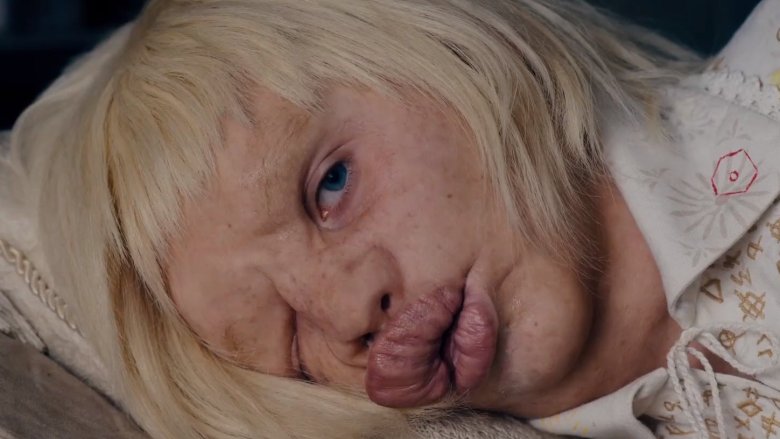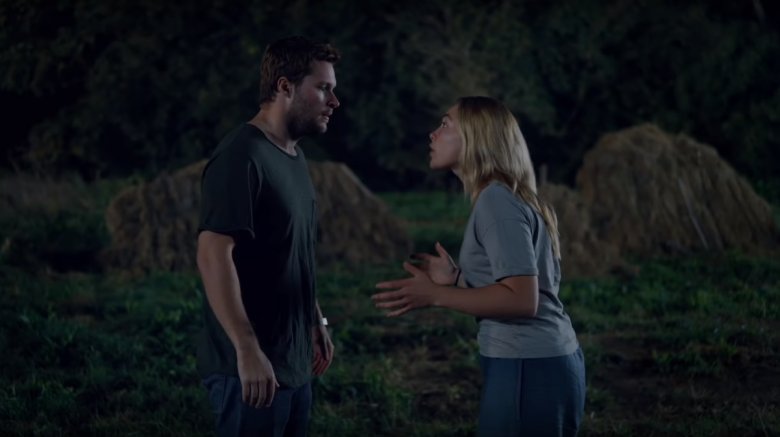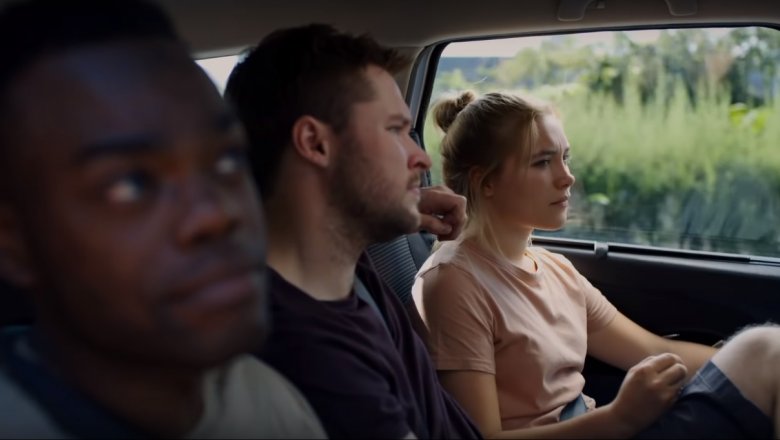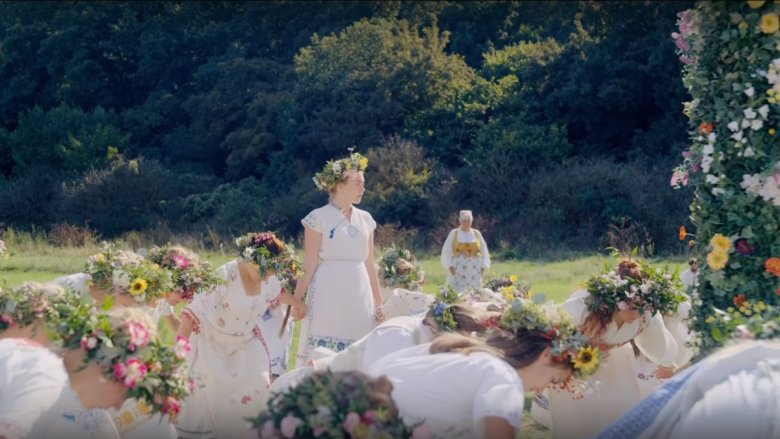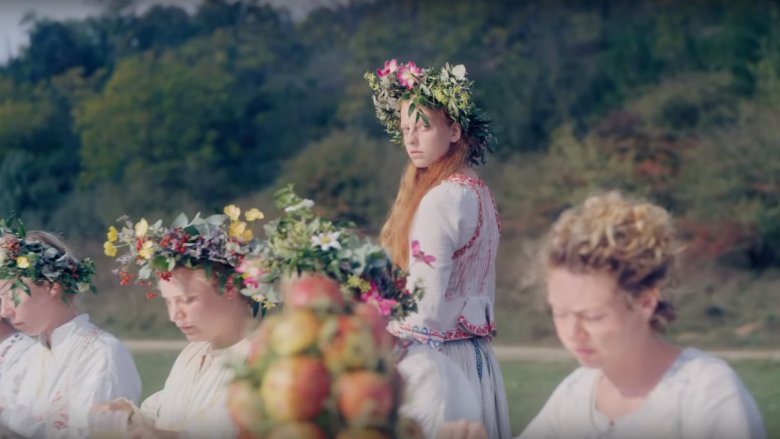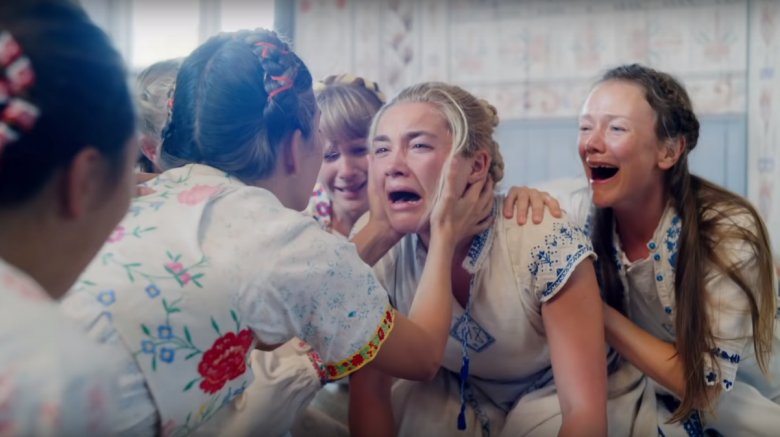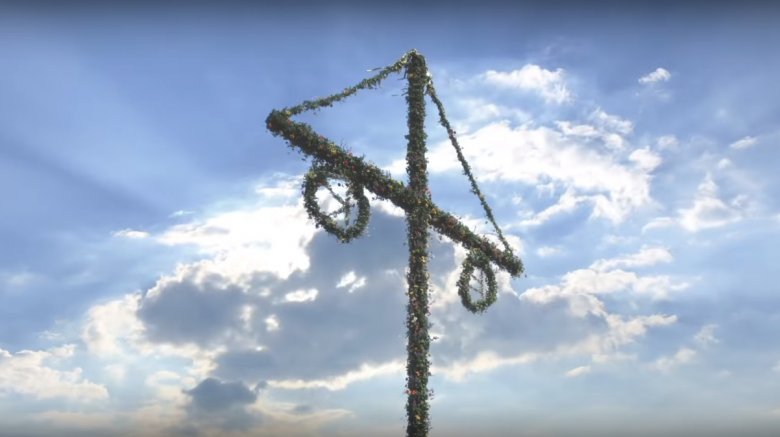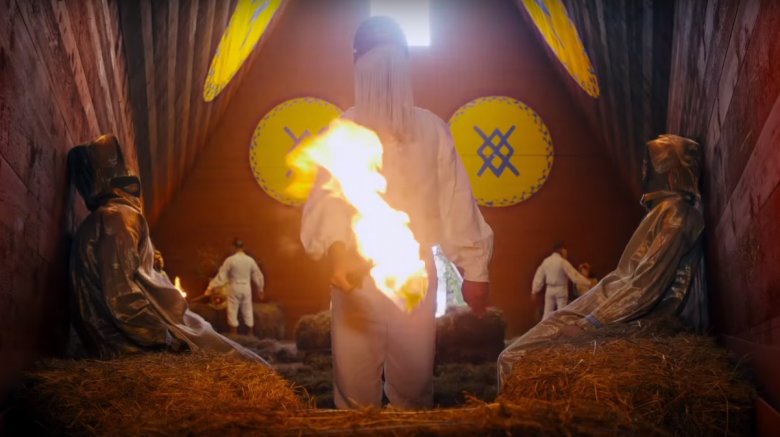The Ending Of Midsommar Explained
More than anything else, Midsommar is a movie about a relationship going up in flames — literally.
As writer-director Ari Aster has explained in many interviews, Midsommar is primarily about a breakup. This is the story that dominates the film — all of the folk horror trappings, from the flower children to the animal sacrifices to the rituals that end in blood, are all there in service of those themes. As Aster said to USA Today, "The goal was ultimately to make a big, operatic breakup movie that feels the way breakups actually feel: catastrophic, like the world is ending."
He's also described his second feature as "a dark contemporary fairy tale," one that he hopes will leave people "feeling a little bit confused about how to feel." If you've seen the movie, you probably get the idea, and based on the movie's middling C+ Cinemascore, plenty of viewers are leaving theaters with mixed feelings. Whether you loved the insanity or found it too puzzling (or even kind of weirdly funny), here's a spoiler-filled explanation at what's going on in the ending of Midsommar.
Breaking up is hard to do
Like a lot of great horror movies, you're not really supposed to take everything that happens in Midsommar literally. Whether all of this crazy stuff is actually happening or not isn't nearly as important as how the characters react to it — particularly Dani, our point-of-view protagonist.
Altered states and hallucinations play a big role in Midsommar's story, and subjectivity is important to how the plot unfolds. From Dani's perspective, the story plays out as a series of increasingly-shocking revelations. The movie looks a lot different from the perspective of Pelle, Christian's friend and member of the Hårga commune, because — when it comes to information — he holds all the cards. Out of all of Christian's friends who come to the Hårga festival, he's the only one who knows what's going to happen.
The audience also gets competing perspectives of Dani and Christian's relationship, around which the plot of the movie revolves. When we view things through Dani's perspective, we see a person who's going through an incredibly traumatic time, needing the support of a loved one more than ever. But the audience also gets a look at Christian's perspective, seeing a guy who's falling out of love with his girlfriend and tired of dealing with her drama, whether any of it is her fault or not. Complicating matters are Christian's friends, who largely don't care for Dani's neediness and are helping him pull away.
Dani the doormat
Dani is a passive protagonist in Midsommar, mostly only reacting to events as they happen to her. Considering how over-the-top tragic a lot of these events are, her reactions typically involve some of the most unhinged screaming and crying that you've ever seen an actor do on screen. Kind of like Hereditary! If there's one thing Ari Aster is definitely good at as a director, it's creating a comfortable environment for his performers to turn on the waterworks and just go nuts.
Dani doesn't necessarily want to be a needy, clingy person. But at the time that we meet her, she's a person in need, looking for something to cling to that the movie just won't let her have. She's on a trip she didn't plan, under the influence of hallucinogenic drugs she didn't initially intend to take. She gives and she gives, hoping all the while that Christian, his friends, or the world in general will just give her a break. At one point, she is seen attempting to meditate, and not quite managing to get her breathing under control. Nothing in her life feels in her grasp until the end of the movie, when she's finally crowned the May Queen, and given ultimate power over the commune — as well as, symbolically at least, the fates of Christian and his friends.
Midsommar flowers on the wall
In Midsommar, flowers represent family, with one clue to this symbolism being the floral wallpaper seen in the bedroom of Dani's parents just before they die. The metaphor can even be extended to plantlife in general — the first time we see Dani after her family's deaths, it's months later, and the houseplants in her apartment are all dead. From a plot perspective, she's been too depressed to water them, but the imagery works as symbolism too.
In the early minutes of the movie, Dani's world is dark and frigid, but things begin turning around for her during the trip, where the sun rarely stops shining and flowers grow in abundance. Before Dani even consciously realizes it, she's being introduced to a new family. The first person to wish Dani a happy birthday — notably, the first birthday she's celebrating without her immediate family in her life — is Pelle, the kind-eyed member of the Hårga.
Dani's suffusion into the cult begins occurring on the movie's final day, when she joins in the drug-fueled dance around the maypole. For the competition, she is gifted a flowered wreath. After she becomes the May Queen, she is literally up to her neck in flowers, covered in them, nearly smothered by the Hårgas' adoration — her brothers and sisters, if she'll have them.
By the end of the movie, it seems like she will. Her old family was violently ended — her new family has a violent start.
Ritualistic uncoupling
The violent, gory, yet somehow beautiful ending of Midsommar works on one level as a shocking sequence of stomach-churning folk horror, but it's also a strong metaphor for a dissolving relationship.
Early on in the movie, Dani, a psychology student, makes reference to the psychological process of a breakup, seeing the signs of her dissolving relationship in Christian's distancing behavior. In her mind, a breakup is almost like a recognizable ritual — a process with defined steps. In that sense, the whole bonkers final sequence can effectively be read as a ritualistic look at a relationship coming to an end.
As the movie begins its third act, both Dani and Christian alienate and agitate their friends with their relationship woes. They become separated, experiencing different parts of the festival on their own. Christian goes into a trancelike state as he cheats on Dani with Maja, the commune girl who's shown signs of being smitten with him ever since his group arrived. Since we've seen him be drugged and hexed to the point where his eyes are cloudy and his mind seems blank, there is a strong sense that he is not doing this voluntarily. His infidelity is urged on by sheer physical desire rather than conscious thought. Meanwhile, Dani goes dancing on her own, less-than-concerned about Christian's whereabouts. With a little help from the admittedly quite freaky Hårga, the long-suffering couple is finally coming apart.
Feel my Midsommar pain
Dani starts Midsommar surrounded by people who don't value her company, or appreciate her pain. Despite her very real problems, her boyfriend and his friend group barely express any sympathy for her. Behind her back, they refer to her as a burden, and talk to her to her face with almost undisguised contempt. All the while, Dani only tries to stay in Christian's good graces, rationalizing his rudeness as always being somehow her fault. The only people who show her kindness seem to be Pelle and the Hårga.
At the end of the movie, Dani bears witness to Christian ritualistically copulating with Maja. The sight proves to be a breaking point, with Dani backing away from the sight in horror. She retreats to the communal bedchamber, accompanied by a coterie of women — followers of the May Queen. As Dani crumbles into an emotional breakdown, the women surround her, emphatically mimicking her every noise and emotion. As her cries turn to wailing, her followers raise up their screams to match her, moving in tandem with her heaving breaths as though they are all one connected organism.
Despite the screaming and the obvious pain of the moment, this sense of true connection and empathy is what Dani has spent the movie looking for. She screams, and everyone around her screams back. Unlike Christian or his friends, they share her pain. Ever since her family died, that's all she's really wanted.
Midsommar references The Wicker Man
People keep referring to Ari Aster as some new master of horror, and while the praises aren't without merit, they kind of gloss over just how much of a sense of humor his movies have. Plenty of the horror sequences in Midsommar toe the line of being laugh-out-loud funny, just for how dramatically things escalate from moment to moment. (The same is also true for Hereditary, as well as Aster's twisted debut short movie, The Strange Thing About the Johnsons.)
One of the funnier aspects about Midsommar's climax is the way the events parallel fellow folk horror film The Wicker Man — as well as that movie's certifiably insane, Nicolas Cage-starring remake. That movie inexplicably involved Cage's character dressing up in a bear costume to disguise himself before eventually just running around punching people, a fact that's impossible not to think about when Christian is rendered paralyzed, and sewn into a bear carcass of his own. It's the same bear briefly shown caged up on the commune grounds earlier in the movie, making what initially seemed to be a visual non sequitur a big furry example of the principle of Chekhov's gun.
Considering how much Aster has credited the original Wicker Man with inspiring Midsommar, it's not hard to read this detail of the bear suit as an intentional nod to the Wicker Man remake, adding a bit of dark absurdist humor to the movie's fiery climax.
Midsommar's God of Vengeance
As Christian and the bodies of his friends are being readied for ritual sacrifice, the proceedings are watched over by a mysterious figure, the person's face invisible behind a thick white veil. The script for Midsommar describes this character as being named Víðarr, the god of vengeance. But while this figure obviously plays into some kind of Hårga ritual, he also serves as a metaphor for Dani's emotional state. The man refers to Christian, wrapped up in the bear carcass, as a "mighty and dreadful beast," whose death will purge the Hårga society of its "most unholy affects."
Even though she may not have ordered it deliberately, this destructive ritual can be read as a very personal action on the part of Dani, on whose orders the commune is now effectively acting. Whether she ordered it or not, this is an act of vengeance on her behalf.
After four years of dating and a months-long, slow withering of her romance with Christian, Dani is finally asserting herself, and guiding the relationship to a permanent end. After spending the whole movie being passive, this sequence represents her consciously letting go, unleashing all of her pent-up frustrations with Christian and his friends, to her relief, and to their doom. It's cathartic, it's weird, and it doesn't make a ton of literal sense. But it does make sense emotionally, making for a haunting final sequence that — as Aster's said he intended — may leave you a little perplexed about how you're supposed to feel.
